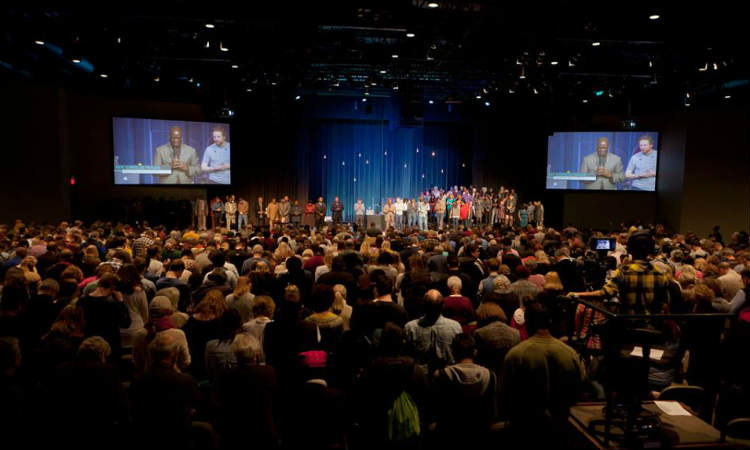This past Sunday, I attended a Unity Service in Columbia, Missouri where over 1,800 people gathered to worship together and start the process of racial reconciliation for our city, state, and nation. Leadership from 30 different black and white churches across mid-Missouri planned the event, after recognizing that an event like this was needed in our town.

As soon as I heard about this service, I made it a point to attend. Something like this doesn't happen often, so I had to be there. As a mom, I need to do things right so that my girls can learn how to be compassionate and listening humans. I kind of felt it in my gut that this service would be a turning point for our city.
As I entered the worship center, my eyes filled with tears. Usually, I see a prominently white crowd. But that night, the church was packed to the gills with a beautiful and diverse group of people representing our city. The worship center was full. Both overflow rooms were full. People were standing in the aisles just to attend the service, all signs to me that this was a much needed gathering.
The evening was a little different from a usual worship service. Police departments gathered in uniform. Clergy from all of the local churches served communion. A gospel choir sang. And instead of a typical sermon, three pastors, all from different backgrounds, sat at a table together and talked about racial unity and our calling to fight for justice as believers.
RELATED: Why Ferguson Should Be Every Mom's Problem
Keith Simon of The Crossing Church led with, "What we have in common in Christ is far more important than any differences we could have."
"If we can worship together, we can work together," continued Bishop Lester Woods of Urban Empowerment Ministries.
With tragedies like Ferguson and the #ConcernedStudent1950 Movement on campus at the University of Missouri, our state has been under the microscope for some time. Outsiders see Missouri as a racially-charged state, while many residents here are broken-hearted, longing for peace and reconciliation.
It's important to learn what words like 'systematic oppression' and 'racism' and 'white privilege' and 'equality' mean—REALLY mean, from the mouths of those that live in it every day.
Alix Carruth, a graduate of The University of Missouri and Columbia resident shares, "To me personally, it was like [the church] was acknowledging the issue in the most public way possible—like hey, we understand that there is racial tension in this city, in this state, in this country, and we understand that it needs to be confronted and talked about and voices need to be heard, and we understand that we as a large church in this town have a responsibility to use our resources and our platform to bring a message of racial unity to this place, and so that's what we're going to do."
I think most people left the service thinking, "What next?" It's one thing to worship and break bread at a formal church service. It's quite another to live out what we believe while at work, in line at the checkout or stuck in traffic on the way home.
"If we are going to truly digest what we have both heard and witnessed, our love has to be truly inclusive. We all have to be more supportive of each other, meaning that we will contribute, encourage and lend a helping hand to all our neighbors," says Mahogany Thomas, a student at Westminster College.
RELATED: Telling My Kids the Truth About Racism
Carruth added, "It's definitely important to listen. It's important to not try to out-yell each other. It's important to not turn it into a battle of 'worse' or 'harder' or anything like that. It's important to listen so that you can learn. It's important to understand what the conversation is about before you attempt to insert yourself into it. It's important to ask questions if you aren't informed, to work to combat ignorance and instead immerse yourself in knowledge. It's important to learn what words like 'systematic oppression' and 'racism' and 'white privilege' and 'equality' mean—REALLY mean, from the mouths of those that live in it every day."
For me, I have just started to listen. With open ears and an open heart, I can begin to see and understand the bigger picture. I have begun to recognize my own stereotypical and racist tendencies. Most importantly, I know it's not okay to mask the issue. I know deep down in my heart that if I want to see change and justice and wrongs made right, I have to do my part.
As Dr. Martin Luther King Jr. once said, "Our lives begin to end the day we become silent about things that matter."
To watch the entire worship service in its entirety, click here.
Photograph by: Dan Gill via The Crossing




